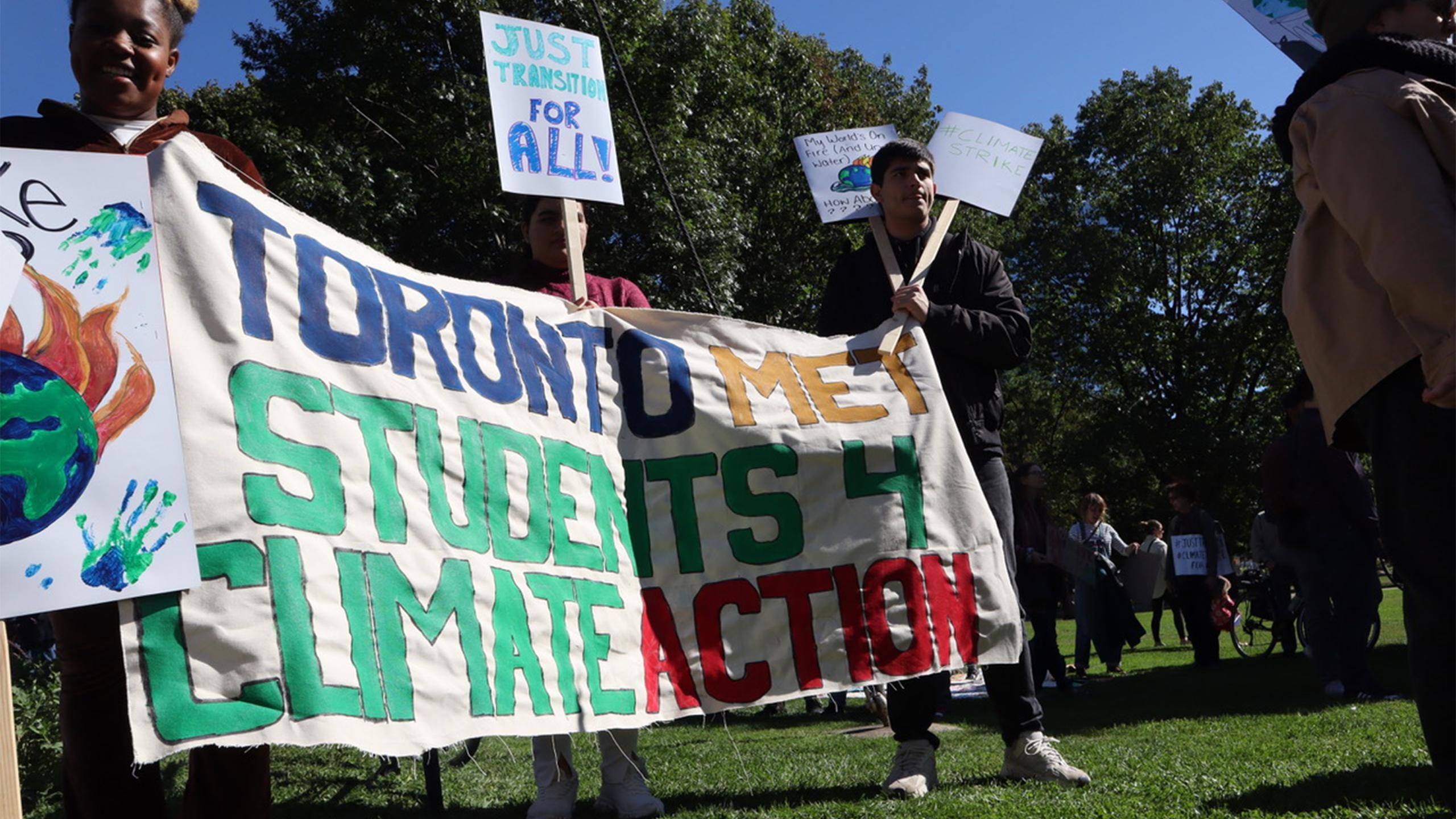By Olivia Wiens
This story has been updated with comment from Toronto Metropolitan University.
Toronto Metropolitan University (TMU) students took to Queen’s Park to demand government climate change reform at The Global Climate Strike on Sept. 23.
Fridays For Future Toronto (FFFTO), the organizers of the strike, are the local branch of an international organization that sparked a global climate strike movement in 2018.
Friday’s strike saw hundreds of protesters, fighting for climate action within all levels of government, according to FFFTO’s website.
In an effort to make significant changes within the city, FFFTO calls for climate change reform from federal, provincial and municipal officials along with other corporations to reduce Canada’s greenhouse gas emissions by 60 per cent before 2030, according to their website.
Fridays for Future also demands the divestment from fossil fuels and wants to bring equity to the forefront of climate action, among other principles.
“We demand that all decision makers in the Canadian government, Ontario government, Toronto government, as well as those in banks, private and Crown corporations, universities, insurance companies, and investment funds take action,” FFFTO said on its website.
The protestors started at Queen’s Park, worked their way along Wellesley Street, Yonge Street and Queen Street before finishing at Nathan Phillips Square.
TMU students gathered before the strike began to march from campus to Queen’s Park as a community. They were led by members of the Toronto Metropolitan Students’ Union (TMSU), who created signs and banners for students at the strike.
“We are student leaders and our goal is to make an impact,” said Aya Bakir, the faculty of arts director at the TMSU.
“If we don’t start bringing awareness and raising attention to the issues that are really affecting our world, then how are the students supposed to realize their role in affecting change?”
Students who participated in the strike walked alongside the TMSU, chanting and making their voices heard. While all were there to protest for climate change, each student had their own reasons for joining the fight.
“It’s less about me personally and more about the movement itself,” said Molly McNiven, a fourth-year sociology student who was a part of the strike. She said she believes that youth and student-led movements, along with their interest in the climate crisis, will lead to revolutionary change.
“We are running out of time,” said McNiven.
Youth, specifically high school and university students, have been at the forefront of Fridays For Future’s climate strikes since they began in 2018, according to FFFTO’s website.
“I think you’re more passionate when you’re young about things like this, because you know that it’s going to affect your future,” said Ray Halliwell, a second-year biology student at the strike.
Some students said they believe TMU isn’t spreading enough awareness about the strike.
“I think [the school] could have made a bigger deal about it,” said Paul Beniaminov, a first-year RTA new media student. “I didn’t know much about [the strike]; it was kind of last-minute.”
In an emailed statement to The Eyeopener, the university said it did not build awareness for the Global Climate Strike.
However, it said it supports “those who are mobilizing to demand a healthy, sustainable future for all, whether that means joining the climate strike or taking other actions to amplify conversations about climate change, research alternatives to fossil fuels, or ensure a clean and just recovery.”
The statement added that TMU has committed to many actions to minimize its impact on climate change.
For example, the school is in the process of creating a climate and sustainability advisory committee, which will include senior-level staff and faculty from across the university. The first meeting will be held this term.
McNiven also said the battle to stop climate change does not end today. “The fight is a long haul to get rid of the system and solve these issues.”
She explained that educating people, especially youth, is the most effective way to truly make a difference in our community.
While there are no official plans yet, Bakir said the TMSU hopes to organize more climate change awareness events throughout the school year. She added that the union is looking to operate more sustainably by decreasing the amount of materials it uses in its products as well as office spaces.
“We’re trying to stay in contact with companies that can provide us with more reusable resources for things like our swag items.”










Leave a Reply